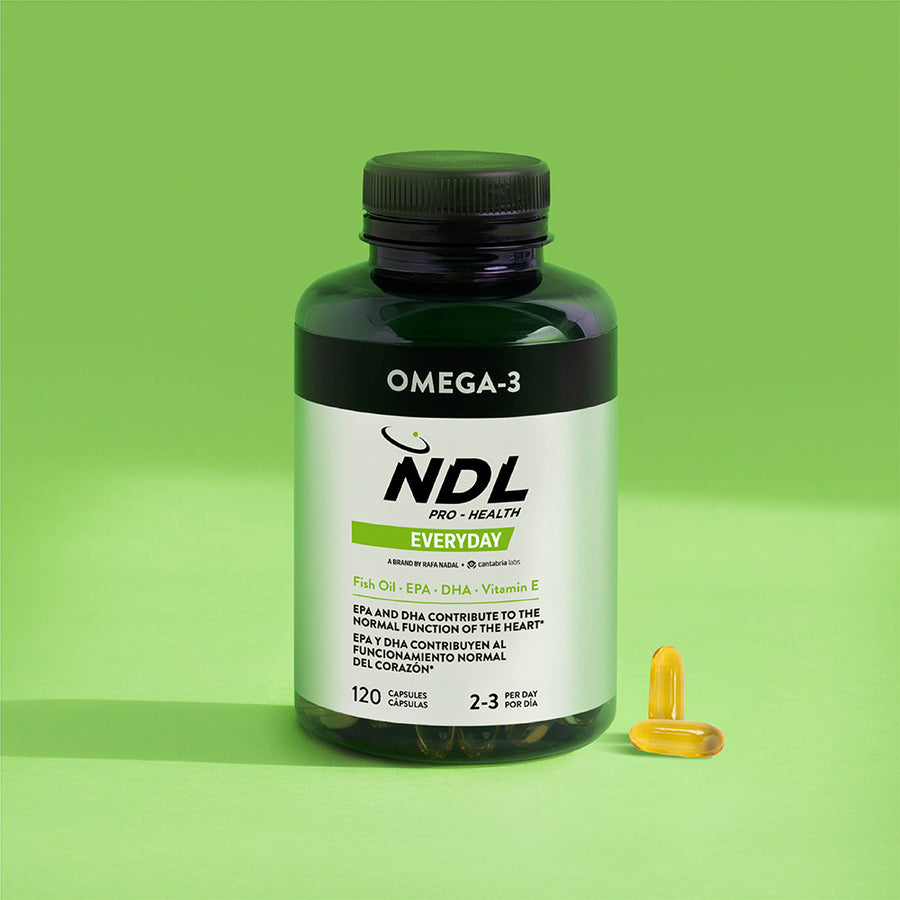Featured Products

Omega-3 with Vitamin E
See productThe benefits of Omega-3 extend to the heart, brain, and overall well-being. An essential nutrient found in fatty fish, seeds, and vegetable oils, proper intake helps prevent cardiovascular disease, improve cognitive function, and reduce inflammation.
In this article, we'll explore the benefits of taking Omega-3, explain what it is, how to incorporate it into your diet, and what precautions to keep in mind to get the most out of it. Discover why this fatty acid is essential for your health!
What is Omega-3?
Omega-3 is an essential fatty acid that the body cannot produce on its own and must be obtained through diet or supplements. It is crucial for heart, brain, and anti-inflammatory health.
Types of Omega-3:
- ALA (Alpha-linolenic acid): found in flaxseeds, chia seeds, and walnuts. It is partially converted into EPA and DHA.
- EPA (Eicosapentaenoic acid): abundant in fatty fish and marine oils; it reduces inflammation and protects the heart.
- DHA (Docosahexaenoic acid): essential for the brain, vision, and neurological development.
Omega-3 is absorbed in the small intestine and transported through the bloodstream to tissues. ALA is converted into EPA and DHA, but only in minimal amounts, so it's recommended to obtain EPA and DHA from marine sources for greater benefit.
Main benefits of Omega-3
When taken regularly, Omega-3 supplements offer many benefits that support multiple functions and processes in the body:
- Cardiovascular health: Omega-3 helps reduce triglycerides and LDL (bad cholesterol), improving heart health. It also helps regulate blood pressure and prevents cardiovascular disease by reducing inflammation and improving circulation.
- Brain function: DHA is essential for brain development and maintenance, supporting memory, focus, and helping prevent cognitive decline.
- Anti-inflammatory properties: Omega-3 has a powerful anti-inflammatory effect, helping with chronic inflammatory conditions like arthritis and joint pain. It also reduces systemic inflammation and improves overall health.
- Eye health: DHA is a key component of the retina and helps prevent macular degeneration, one of the leading causes of vision loss with age. It supports eye health and visual function throughout life.
- Support for sports performance and muscle recovery: Omega-3 promotes muscle recovery by reducing post-exercise inflammation and muscle damage. It may also improve endurance and help prevent injuries, benefiting athletic performance.
- Skin and hair health: Its hydrating effect improves skin elasticity, slowing premature aging. It also helps reduce acne and skin conditions, keeping skin healthier, while strengthening hair and nails.
Omega-3 is an essential ally for health in many areas, and regular consumption can make a real difference in overall well-being.
How to include Omega-3 in your diet?
As mentioned earlier, Omega-3 is an essential nutrient and can be obtained through food or supplements. Here are the best ways to include it:
Natural sources of Omega-3:
- Fatty fish: salmon, tuna, sardines, mackerel, and herring are rich in EPA and DHA.
- Seeds and nuts: chia seeds, flaxseeds, and walnuts are plant-based sources of ALA, though their conversion to EPA and DHA is limited.
- Vegetable oils: flaxseed, canola, and soybean oil provide ALA.

Omega-3 supplements:
If your diet lacks enough natural sources, supplements can be a great option. Consider the following when choosing one:
- Purity and quality: look for products free from heavy metals and certified for purity.
- EPA and DHA content: a good supplement should contain meaningful amounts of these essential fatty acids.
- Best time to take it: it’s recommended to take it with meals rich in healthy fats to enhance absorption.
Adding Omega-3 to your diet is a simple and effective way to improve your health. Whether through natural sources or quality supplements, regular intake helps support your heart, brain, and joints. Choose the option that best suits your lifestyle and enjoy its long-term benefits.
Recommendations and precautions
As we’ve seen, Omega-3 has many health benefits, but it should be consumed in the right amounts and with certain precautions.
Recommended daily intake: Daily Omega-3 needs vary based on age, health status, and lifestyle. Generally, for healthy adults, 250–500 mg of EPA and DHA per day is recommended.
Possible side effects and contraindications: Omega-3 is safe for most people, but high doses may cause:
- Digestive issues like nausea, diarrhea, or reflux.
- Fishy aftertaste.
- Changes in blood clotting, which may increase the risk of bruising or bleeding in some people.
Interaction with anticoagulant medications: Omega-3 has a natural blood-thinning effect and may enhance the effect of blood thinners. If you take such medications, consult your doctor before supplementing with Omega-3.
Therefore, a balanced intake of Omega-3 is key to enjoying its benefits safely.
In conclusion, the benefits of Omega-3 make it a fundamental fatty acid for the body, with positive effects on cardiovascular and brain health and inflammation reduction. Including it in your diet through fatty fish, seeds, vegetable oils, or quality supplements can significantly improve daily well-being. To enjoy its benefits safely, consume the right amount and consider possible interactions with medications if applicable.

From the NDL Pro-Health team we will provide you with tips to maintain a healthy lifestyle. Sharing knowledge and product recommendations to offer optimal solutions for your daily routine, for your workouts and subsequent recovery, all with the goal of helping you achieve physical and mental wellness.

















